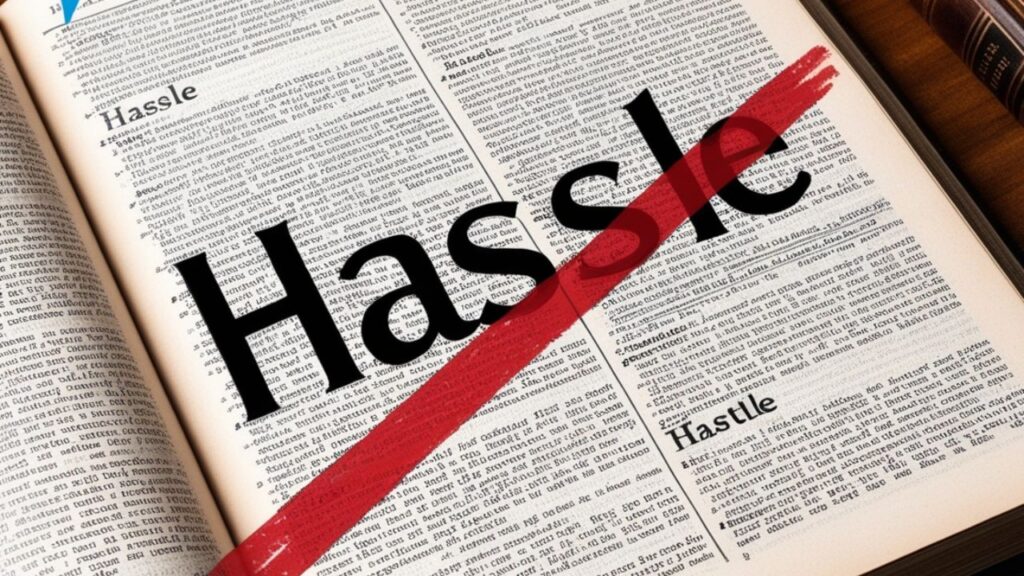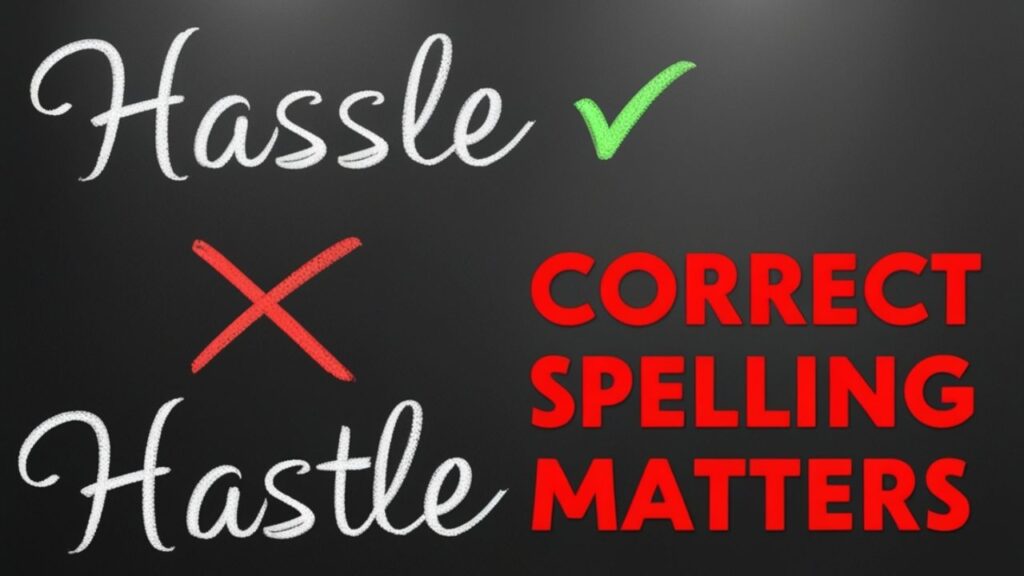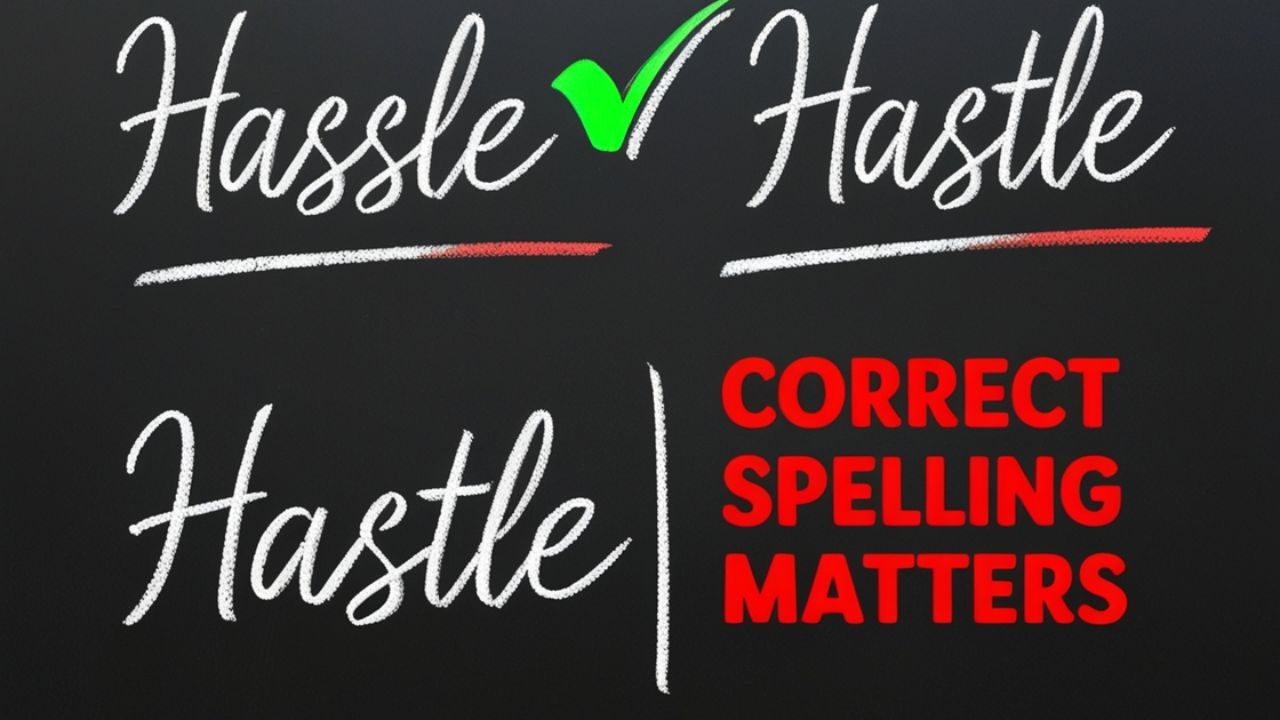The right word is hassle, and it shows when something feels annoying or difficult. The form with “t” is not part of English. Using the proper spelling keeps sentences neat and helps others understand messages quickly.
As a noun, hassle describes a problem, like waiting in a long line. As a verb, it means bothering someone, like asking too many questions. Knowing these two uses makes writing smoother and speaking more accurate.
People sometimes type the wrong form because of words that sound similar. Fast speech or typing can also cause confusion. A simple trick is to remember it rhymes with castle, which makes the correct spelling easier to recall.
What Does “Hassle” Mean?
Hassle can function as both a noun and a verb, each carrying related but distinct meanings.
Hassle as a Noun
- Annoying situation – “Waiting in long traffic was a real hassle.”
- Difficulty or problem – “Filling endless forms created a big hassle.”
- Inconvenience in tasks – “Moving to a new house brings plenty of hassle.”
Hassle as a Verb
- To bother someone – “Don’t hassle me while I’m studying.”
- To pressure or annoy – “She kept hassling him for answers.”
- To trouble repeatedly – “They hassled the witness with endless questions.”
See also : Arised vs Arose: Learn the Right Past Tense of Arise
Quick Table: Hassle as Noun vs Verb
| Part of Speech | Meaning | Example Sentence |
| Noun | Annoying/difficult situation | “The paperwork was a real hassle.” |
| Verb | To bother or annoy | “Stop hassling me about the project.” |
How to Use “Hassle” Correctly in Sentences
Understanding the meaning is only half the battle. You also want to know how to use hassle naturally.
Examples with Hassle as a Noun
- “Finding parking in the city is always a hassle.”
- “The paperwork turned into a major hassle.”
- “Traveling during holidays can be such a hassle.”
- “Returning faulty products often becomes a big hassle.”
- “The hassle of moving houses makes many people tired.”
Examples with Hassle as a Verb
- “Stop trying to hassle me while I’m busy.”
- “Reporters hassled the actor with too many questions.”
- “Don’t hassle the waiter; he’s doing his job.”
- “She kept hassling her brother about the homework.”
- “The salesman tried to hassle people into buying more.”
Common Mistakes to Avoid
- Writing hastle instead of the correct spelling hassle.
- Mixing up hassle with hustle, which has a different meaning.
- Using “an hassle” instead of a hassle.
- Forgetting that hassle as a verb usually needs an object.
- Overusing the word in formal writing where a stronger term fits better.
Grammar Tip
- Hassle works as both a noun and a verb.
- As a noun, it describes problems, annoyances, or inconveniences.
- As a verb, it usually takes a direct object (e.g., “Don’t hassle me”).
- Avoid writing “an hassle” — always use a hassle.
- In formal texts, replace hassle with precise words like “difficulty” or “inconvenience.”
Etymology and Origin of “Hassle”
| Year | Usage Example | Source |
| 1910s | “Don’t give me any hassle.” | Early 20th-century slang |
| 1950s | Became popular in American English slang | Popular culture influence |
Why Do People Confuse “Hassle” with “Hastle”?

The confusion isn’t random. Several factors fuel the mix-up.
Phonetic Similarity
The “s” and “t” sounds blur in fast speech, causing some to insert a “t” where none belongs.
Influence of Similar Words
Words like “hustle,” which is correctly spelled with a “t,” might subconsciously influence people to write “hassle.”
Autocorrect and Digital Communication
Many people depend on autocorrect when sending texts or writing online. This tool changes words quickly, but sometimes it suggests the wrong form. Small errors can appear in school work, emails, or messages, which makes the writing look less careful.
In digital communication, mistakes spread fast because people type quickly. Wrong words may pass unnoticed, and readers accept them as correct. Checking spelling before sending any message is the best way to keep writing clear and professional in every situation.
See also : 20 Unique Phrases Instead of Good Luck in Future Endeavors
Examples of “Hassle” Misuse
- Writing hastle instead of the correct spelling.
- Saying “an hassle” instead of a hassle.
- Using hassle when the right word is hustle.
- Typing hastling instead of hassling.
- Using hassle in very formal documents where precise terms are required.
Easy Tricks to Remember the Correct Spelling of “Hassle”
One way to remember hassle is to think of the rhyme with castle. Just drop the “t,” and the spelling becomes clear. The double “s” also makes the word easy to notice and simple to recall.
Another simple idea is to picture the double “s” like a snake sliding through the word. This image helps children and adults keep the spelling right. Short memory tricks like these make writing smoother and more confident.
Quick Mnemonics Table
| Mnemonic Technique | Example/Explanation |
| Word Breakdown | “has + sle” (double s, no t) |
| Rhyming Trick | Rhymes with “castle” but drop the “t” |
| Visual Memory | Double “s” as a snake (persistent hassle) |
| Phrase Association | “Don’t give me any hassle.” |
Hassle in Popular Culture and Media
The word hassle often appears in movies, books, and songs to describe small problems in daily life. Characters use it when talking about stress, school, work, or even friendships, which makes the term easy for people to understand and remember.
In television shows, hassle is spoken during funny or stressful moments, helping the audience connect with real experiences. Writers and musicians also include it in stories and lyrics, showing how common the word has become in popular culture around the world.
Summary: Key Takeaways on Hassle vs Hastle

- The correct spelling is always hassle; hastle is a mistake.
- Hassle can be used as both a noun and a verb.
- It describes problems, annoyances, or bothering someone.
- Confusion comes from similar words like hustle or fast speech.
- Memory tricks like rhyming with castle help avoid spelling errors.
Additional Resources to Perfect Your Spelling
| Resource | Link | Description |
| Merriam-Webster Dictionary | merriam-webster.com/dictionary/hassle | Definition and examples |
| Oxford English Dictionary | Historical usage and etymology (subscription needed) | |
| Grammarly Blog | grammarly.com/blog | Tips on common spelling mistakes |
Final Thought
The word hassle is simple, but using it correctly makes writing stronger. A small mistake may look unimportant, yet it can change how others see your work. Clear spelling shows care and attention in every situation.
Learning the right form also builds good habits for the future. When you practice, the correct spelling becomes natural. With patience and simple memory tricks, anyone can write with confidence and avoid easy errors.
FAQS:
What is the meaning of Hastle?
Hastle has no meaning in English. It is only a spelling mistake of hassle, which means trouble, difficulty, or an annoying problem.
Is it a hassle or an hassle?
The correct form is a hassle, because the word begins with a consonant sound, not a vowel. “An hassle” is always wrong.
What is the meaning of Hastling?
Hastling is not a real English word. People confuse it with hassling, which means bothering, pestering, or troubling someone repeatedly.
What does Hastle free mean?
Hastle free is incorrect spelling. The right phrase is hassle-free, which means something simple, easy, and without problems or stress.

Join Bibcia on a journey to master English grammar. Discover easy lessons, writing tips, and practical examples designed to make learning grammar simple and effective.










